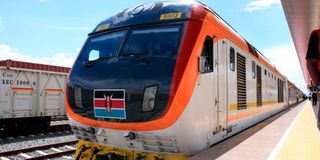Two activists sue for release of SGR-related documents

An SGR train at the Nairobi terminus on April 27, 2019.
Two activists have sued in a Mombasa court seeking the disclosure of documents related to the Sh450 billion Standard Guard Railway (SGR) project.
Wanjiru Gikonyo and Khelef Khalifa want all contracts, agreements and studies related to the construction and operations of the railway made public.
They argue that keeping the documents confidential violates the law and discourages transparency in governance.
“SGR is the largest capital-intensive infrastructure project ever constructed in Kenya. But despite this extraordinary expenditure of public funds, the SGR project has been undertaken with controversy and secrecy from its inception,” they said.
They lament in court documents that fundamental information about the project’s financing, tendering and construction has not been released to the public.
Their concerns are based on fears that the Mombasa port might have been used as a collateral for the Chinese loans that built the rail line, thus exposing it to a takeover by a foreign government in the event Kenya defaults.
Key contracts related to these aspects of the project remain secret, the petitioners argue. They say procedures in the Public Procurement Act have been routinely disregarded.
They also argue that the secrecy surrounding the SGR project has been aggravated by the fact that it is being operated by Africa Star Railways Company Ltd, a private firm that they allege is paid more than Sh1 billion per month in operational costs.
The case comes as government statistics show that SGR has operated at a financial loss since its inception in 2017.
The petitioners argue that SGR is not making enough money to help in repaying the loans that built it.
“It is not publicly known what the consequences of a default in loan repayment would be according to the agreement between Kenya and China,” they say.
Such a capital-intensive project with a wide-ranging impact on the public purse and citizens’ livelihoods, they argue, was undertaken with no public participation.
Mr Khalifa is with Muslims for Human Rights while Ms Gikonyo is the national coordinator at the Institute for Social Accountability. They operate under Okoa Mombasa, a coalition of workers’ unions, businesses, professional associations and civil society groups addressing the well-being of Mombasa residents.
Among other concerns, they argue that the government has not provided to them as requested all agreements and contracts entered into, including loan deals, concession pacts, guarantees and or collateral for financing, construction, management and operation of the SGR.
“We have written to the government over this but they have not complied with this request and have failed to cite a valid exception to producing the documents or provide a valid reason for their impugned decisions for not providing the documents,” they say.
The petitioners have sued the principal secretaries Ministry of Transport and National Treasury, Solomon Kitungu and Dr Julius Muia, respectively, and Attorney-General Kariuki Kihara.
They want the court to compel the respondents to provide the requested details of the SGR project promptly.
Disclosing the contracts and agreements relating to the project, they argue, will foster more informed public participation and debate on SGR and its impact, as well as more accountability and openness in public finance.
The Katiba Institute and the Commission on Administrative Justice have been listed as interested parties.





